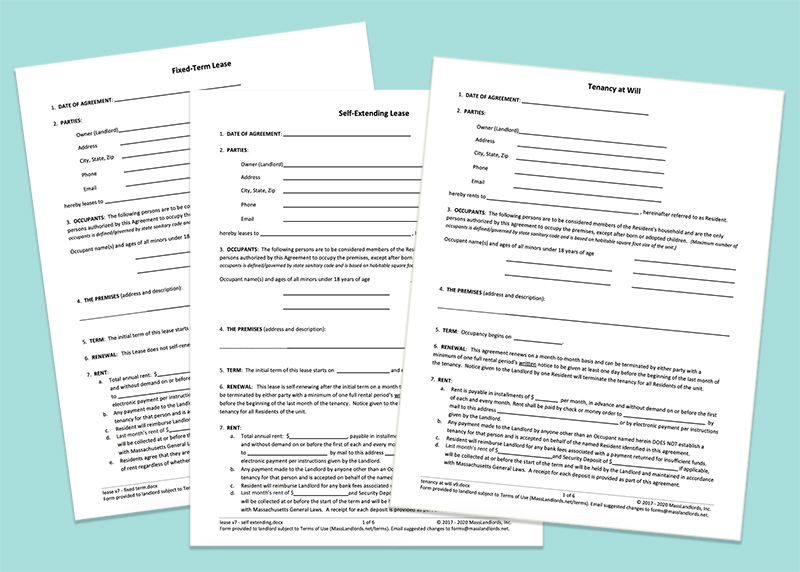Frequently Asked Questions about Our Fixed-term and Tenancy-at-will Leases
We are proud to offer rental agreement templates for both fixed-term leases and tenancy-at-will occupancies (frequently known as month-to-month rental agreements). These forms are meant to appeal to a broad audience, but also contain optional clauses you may add as necessary. We also have a self-extending, or auto-renewing, lease available.

Our rental agreement forms are designed to be a jumping-off point for all situations. Make sure you look over our optional clauses to get a rental agreement that’s just right for you.
After reviewing these agreements, some landlords had further questions. We’ve found if one person is asking, usually, others are wondering, so we are providing our answers here. This page will be updated as needed.
Why does the rental agreement say, “reasonable notice” for entry instead of 24 hours? Isn’t that standard?
“Reasonable” is totally dependent on the situation. Sometimes, 24 hours might be reasonable notice. But if a tub has overflowed and is flooding the downstairs unit, 24 hours is way too long to gain entry to fix the problem. In that case, “reasonable” might be shouting through the door “It's the landlord, I'm coming in!”
A 24-hour notice was proposed for the next round of state sanitary code revisions and we filed testimony against it for this reason. For situations you know about in advance (non-emergent repairs, inspections, etc.), we suggest you give your tenants one full business day of notice for each day of planned interruption.
Should I put something in the agreement that allows me to limit the size of gatherings that can occur at the rental site?
Tread lightly here. Trying to stop a peaceful but large family gathering could invite a disparate impact claim on the basis of family or marital status. That said, there have been porch collapses related to too many people on balconies or decks. You should be able to put something in restricting the number of people you can safely have in those areas. Restrictions for “live load” situations may be coming in future updates to the forms.
Is there something in the agreement requiring my tenants to notify me about extended absences?
Make sure you review the optional clauses we have available! Optional clause D covers this exact situation. Note that restricting someone from leaving for nine months at a time or similar could invite a disparate impact claim on the basis of current service in the armed forces.
We don’t include the optional clauses in the primary agreements because there are many different types of business agreements and situations. The primary agreements are meant to be starting points common to all.
Your agreement does not specifically prohibit selling or providing alcohol to a minor or intoxicated person. Why is this?
Verbiage in our primary agreements covers this situation indirectly. The lease states that the tenant will "Follow all federal and state laws and local ordinances while on the premises” and stipulates the tenant "will not... Use the premises as a business." This prohibits your tenants from serving underage people (against the law) or selling alcohol to anyone (against the lease).
Can I offer a lock change at the beginning of the tenancy (with a fee)?
We have made a note to add the lock fee to the 7d paragraph discussing last month's rent and security deposit. Make sure you are also using the move-in monies receipt, which covers this.
Why doesn’t the agreement give me the option to specify where any legal issues will be heard? For instance, can I specify a jurisdiction where cases must be filed?
The Housing Court already has its own standards as to what's reasonable in these areas, and regardless of what you have in your contract, if there's a dispute they're going to use their standards. Your lease can say that any dispute will be heard in your local district court, but if the tenant asks that the case be transferred to Housing, that's what's going to happen, whether you like it or not. Tenants have an absolute right to transfer a case to Housing Court.
Why does the agreement have language like “resident will ensure occupants and visitors refrain from smoking” instead of just saying “no smoking is permitted in the unit”?
We prefer to use positive language whenever possible. Stating someone will do something provides positive incentive to act in the required manner. Negative language begets negative behavior or no behavior. In this case, failure to act to prevent a visitor from smoking is itself an evictable offense, even if the renter was not themselves smoking.
Did We Miss Something?
Still have questions about our rental agreement forms? Don’t be shy, email us at hello@masslandlords.net. We’ll update this page as we get more inquiries, so check back often!




